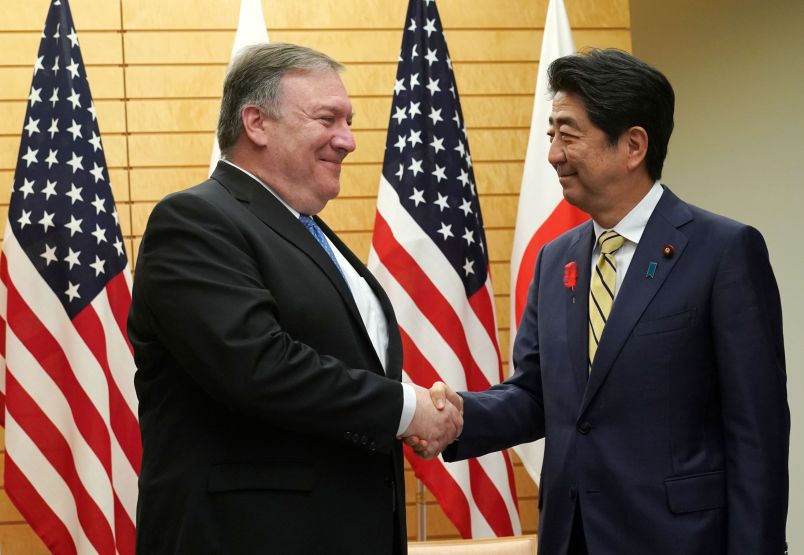TOKYO (AP) — U.S. Secretary of State Mike Pompeo pledged Saturday that the Trump administration’s effort to get North Korea to give up its nuclear weapons would be fully coordinated with allies Japan and South Korea, as he prepared to travel to Pyongyang under pressure to produce tangible progress toward that goal.
Pompeo met Japanese Prime Minister Shinzo Abe in Tokyo on the eve of his fourth visit to North Korea, during which he’ll be looking to arrange a second summit between President Donald Trump and North Korean leader Kim Jong Un and plot a path forward on denuclearization. Japan, notably, has been wary of Trump’s initiative, fearing it could affect its long-standing security relationship with the U.S.
Pompeo told Abe that it is important for him to hear from the Japanese leader “so we have a fully coordinated and unified view” and vowed to raise the cases of Japanese citizens abducted by North Korea when he sees Kim and officials in Pyongyang on Sunday. Pompeo will then travel to South Korea and China to review the negotiations.
“It is important for us to hear from you as I travel to Pyongyang to make sure that we are fully in sync with respect to missile programs, (chemical and biological weapons) programs,” Pompeo told Abe. “We will bring up the issue of the abductees as well and then we will share with you how we hope to proceed when we are in Pyongyang tomorrow.”
Pompeo’s diplomatic offensive comes as Trump presses to meet with Kim for a second time after their June summit in Singapore produced a vague agreement on denuclearization with few, if any, specifics. Despite the historic meeting, the two sides are deadlocked over how to achieve that goal and Trump canceled Pompeo’s initial planned return to North Korea last month.
In contrast with South Korea, whose President Moon Jae-in has been at the forefront of encouraging Trump’s rapprochement with the North, Japan has been decidedly cautious, insisting that its interests and concerns be addressed.
Abe did not speak of differences but highlighted the importance of demonstrating to the world that the U.S.-Japan alliance is “more robust than ever” and stressing the importance of “thorough coordination” with Washington on all aspects of North Korea policy.
Pompeo has repeatedly refused to discuss details of negotiations, including a U.S. position on North Korea’s demand for a declared end to the Korean War and a proposal from Seoul for such a declaration to be accompanied by a shutdown of its main known nuclear facility.
Speaking aboard his plane on Friday, Pompeo said his mission was to “make sure that we understand what each side is truly trying to achieve … and how we can deliver against the commitments that were made” in Singapore. He said they would develop options, if not finalize, the location and timing of a second Trump-Kim summit.
He has also distanced himself from an earlier stated goal of achieving North Korea’s nuclear weapons abandonment by the end of Trump’s term in January 2021.
Since the effort got underway with a secret visit to the North by then-CIA chief Pompeo in April, there has been only limited progress.
North Korea so far has suspended nuclear and missile tests, freed three American prisoners and dismantled parts of a missile engine facility and tunnel entrances at a nuclear test site. It has not taken any steps to halt nuclear weapons or missile development.
The North also has accused Washington of making “unilateral and gangster-like” demands on denuclearization and insisted that sanctions should be lifted before any progress in nuclear talks. U.S. officials have thus far said sanctions will remain in place until the North’s denuclearization is fully verified.
Absent sanctions relief, North Korea has rejected turning over what Washington really wants in return: a complete inventory of its nuclear and ballistic missile facilities that could be used by international inspectors to verify they have been dismantled.



